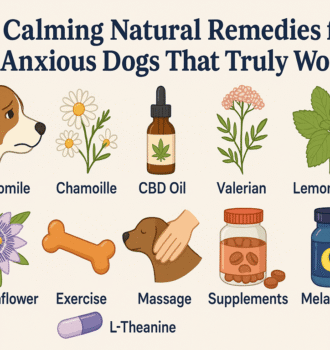In today’s world, where mental health is finally getting the attention it deserves, pet mental health is becoming just as vital. We often celebrate our pets for being loyal, comforting companions, but how often do we stop to think about their emotional needs? The truth is, animals experience stress, anxiety, boredom, and even depression—just like we do. When left unaddressed, these emotional imbalances can lead to changes in behavior, eating patterns, and physical health.
As a dog or cat parent, you’ve likely seen the signs: restlessness when you leave the house, tail-chasing that goes beyond play, or hiding during loud noises. While these moments can seem minor, they’re often signals that your pet is struggling emotionally.
Fortunately, you have more power than you think. Whether it’s creating a consistent routine, offering enriching play, or supporting them through natural remedies, boosting your pet’s mental health can dramatically improve their happiness and strengthen your bond. In this guide, we’ll walk through evidence-based, heart-centered ways to support your pet’s emotional well-being. So they not only live longer, but love better.

Understand the Early Signs of Pet Stress
Contents
- 1 Understand the Early Signs of Pet Stress
- 2 Create a Grounding Routine
- 3 Use Interactive Play and Brain Games
- 4 Nourish Emotional Health Through Diet
- 5 Explore Natural Calming Remedies
- 6 Make Vet Visits Emotionally Safe
- 7 Show Up Emotionally for Your Pet
- 8 Takeaway: Your Pet’s Emotions Matter Every Day
- 9 Frequently Asked Questions About Pet Mental Health
Mental health challenges in pets often go unnoticed until they escalate. Dogs may bark excessively, hide, destroy objects, or suddenly lose interest in play. Cats may overgroom, skip meals, or hiss at familiar family members.
We often assume it’s a behavior issue when it’s emotional. If your dog is howling at night, it may be from anxiety—not disobedience. You can read more about how to stop a dog from barking at night in our in-depth behavior guide.
According to Calder Vets UK, prolonged stress can lead to long-term health concerns like lowered immunity and digestive issues.
Create a Grounding Routine
Structure makes your pet feel safe. Whether it’s a daily feeding schedule, morning walk, or designated nap time, predictable routines help lower anxiety by reducing the unknown.
Dogs, in particular, thrive when they can anticipate what’s next. A sudden change—like a move or a new baby—can lead to behavioral dips. Even something as simple as feeding at consistent times makes a difference.
If you’re caring for active breeds like the Odysseus dog, adding outdoor safety routines further boosts their sense of control.
Use Interactive Play and Brain Games
Stimulation isn’t just about toys. It’s about activating your pet’s brain to reduce anxiety, boredom, and even depression. Games like treat scavenging or learning unique tricks build confidence while encouraging positive behavior.
As ManyPets UK suggests, enrichment activities such as snuffle mats, puzzle feeders, and hide-and-seek reduce cortisol (the stress hormone) and build curiosity.
I’ve seen dogs with separation anxiety transform once play became part of their daily mental workout.
Nourish Emotional Health Through Diet
There’s a direct link between nutrition and behavior. Just like a sugar crash in kids, poor-quality food can cause hyperactivity, irritability, and poor sleep in pets.
Look for foods high in omega-3s, amino acids, and probiotics to support gut-brain health. Brands like Natural Balance dog food use clean ingredients that reduce inflammation and support mood regulation.
According to PetMD, dogs on high-carb or artificial diets may show signs of increased anxiety or lethargy.
Explore Natural Calming Remedies
Natural anxiety support has gained traction among holistic vets and experienced pet parents alike. Calming chews with L-theanine, CBD drops, lavender oil sprays, and thunder shirts offer non-pharmaceutical solutions.
Our full article on natural remedies for anxious dogs explains how these work in real-world situations like fireworks, travel, or grooming.
As The Times points out, simple tools like white noise and blackout curtains can also dramatically reduce anxiety during noisy events.
Make Vet Visits Emotionally Safe
The vet doesn’t have to be a scary place. Reward-based training before and after appointments builds resilience. Bringing familiar items like a blanket or toy, using positive language, and choosing fear-free clinics help pets feel secure.
Routine care also lets vets spot signs of mental decline before it becomes serious. Our guide on the importance of regular vet visits covers how checkups help not just physically but emotionally, too.
Show Up Emotionally for Your Pet
Your presence means everything. Five minutes of eye contact, play, or gentle talking can make a stressed animal feel grounded again. Studies show that pets mirror our emotional state, so the calmer we are, the more they relax.
If you’re too busy for long walks every day, focus on short moments of mindfulness. Rub their ears. Say their name with warmth. Let them feel seen.





